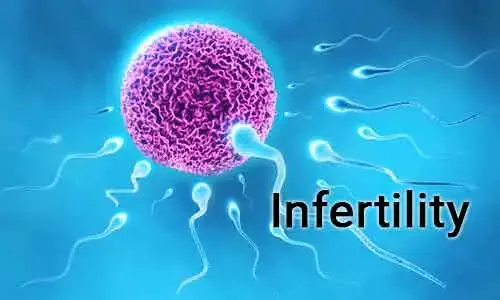- Home
- Medical news & Guidelines
- Anesthesiology
- Cardiology and CTVS
- Critical Care
- Dentistry
- Dermatology
- Diabetes and Endocrinology
- ENT
- Gastroenterology
- Medicine
- Nephrology
- Neurology
- Obstretics-Gynaecology
- Oncology
- Ophthalmology
- Orthopaedics
- Pediatrics-Neonatology
- Psychiatry
- Pulmonology
- Radiology
- Surgery
- Urology
- Laboratory Medicine
- Diet
- Nursing
- Paramedical
- Physiotherapy
- Health news
- Fact Check
- Bone Health Fact Check
- Brain Health Fact Check
- Cancer Related Fact Check
- Child Care Fact Check
- Dental and oral health fact check
- Diabetes and metabolic health fact check
- Diet and Nutrition Fact Check
- Eye and ENT Care Fact Check
- Fitness fact check
- Gut health fact check
- Heart health fact check
- Kidney health fact check
- Medical education fact check
- Men's health fact check
- Respiratory fact check
- Skin and hair care fact check
- Vaccine and Immunization fact check
- Women's health fact check
- AYUSH
- State News
- Andaman and Nicobar Islands
- Andhra Pradesh
- Arunachal Pradesh
- Assam
- Bihar
- Chandigarh
- Chattisgarh
- Dadra and Nagar Haveli
- Daman and Diu
- Delhi
- Goa
- Gujarat
- Haryana
- Himachal Pradesh
- Jammu & Kashmir
- Jharkhand
- Karnataka
- Kerala
- Ladakh
- Lakshadweep
- Madhya Pradesh
- Maharashtra
- Manipur
- Meghalaya
- Mizoram
- Nagaland
- Odisha
- Puducherry
- Punjab
- Rajasthan
- Sikkim
- Tamil Nadu
- Telangana
- Tripura
- Uttar Pradesh
- Uttrakhand
- West Bengal
- Medical Education
- Industry
Low BMI associated with Unfavorable intrauterine insemination treatment outcomes

CHINA: BMI is favorably correlated with cumulative intrauterine insemination (IUI) treatment outcomes in women with a BMI under 30 kg/m2, according to a study published in the Journal of Assisted Reproduction and Genetics.
Particularly, compared to normal weight and overweight women, underweight women may have a reduced likelihood of pregnancy.
Approximately 10-15% of couples, or more, struggle with infertility. Due to its ease and low cost, intrauterine insemination (IUI) is undoubtedly the therapy of choice for couples whose infertility is due to mild or unexplained male factor infertility.
Age, infertility diagnosis, body mass index (BMI), and semen quality are some of the variables that have been connected to the likelihood of conception after IUI cycles. Among them, BMI has consistently been shown to be a poor predictor of success with assisted reproduction.
Notably, numerous studies found that BMI was favorably correlated with conception after IUI, suggesting that being underweight rather than being obese has negative effects.
The authors of the current study set out to determine if body mass index (BMI) and pregnancy outcomes in women undergoing intrauterine insemination (IUI) treatment are related.
As per BMI, the study included 6407 women who underwent 13,745 IUI cycles. The correlation between BMI and the total number of cumulative live births throughout numerous IUI cycles was examined using Cox regression. The analysis of the live birth rate each cycle was conducted using a generalized estimating equation (GEE).
Key findings of the study:
- Underweight women (n = 990) had a reduced cumulative pregnancy and live birth rate compared to normal-weight women (n = 4563), while overweight women (n = 854) had a higher cumulative pregnancy and live birth rate compared to normal-weight women (31.97%, 26.58%).
- The hazard ratio (HR) for attaining a live birth after a maximum of four IUI cycles, adjusted for covariates, was 0.80 (95% CI: 0.67-0.95), contrasting underweight with normal weight.
- Low BMI was also linked to a decreased per-cycle birth rate in the GEE studies after adjusting for cycle-specific factors such ovarian stimulation, endometrial thickness, and follicular diameter (OR 0.79, 95% CI: 0.66-0.95).
According to Jianzhi Ren and team from the Reproductive Medicine Center at the Xiamen University Affiliated Chenggong Hospital, "With growing concerns about the health effects of obesity, numerous authors have simply ignored underweight women or combined them with women with normal BMI."
Nevertheless, the researchers concluded that their data "suggest that while giving advice to patients undergoing IUI treatments, underweight as well as obesity should be considered."
REFERENCE
Zheng, J., Cai, J., Liu, L. et al. Low BMI is associated with poor IUI outcomes: a retrospective study in 13,745 cycles. J Assist Reprod Genet (2022). https://doi.org/10.1007/s10815-022-02658-y
Dr Kamal Kant Kohli-MBBS, DTCD- a chest specialist with more than 30 years of practice and a flair for writing clinical articles, Dr Kamal Kant Kohli joined Medical Dialogues as a Chief Editor of Medical News. Besides writing articles, as an editor, he proofreads and verifies all the medical content published on Medical Dialogues including those coming from journals, studies,medical conferences,guidelines etc. Email: drkohli@medicaldialogues.in. Contact no. 011-43720751


